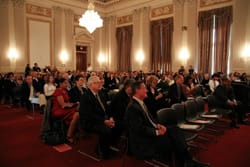IGE Co-Sponsors Event on Capitol Hill, Raises Profile of International Religious Freedom
 The 28 March 2012 International Religious Freedom Event on Capitol Hill, co-sponsored by IGE, was a success with more than 160 people attending. Over 100 members of civil society groups and 60 U.S. government representatives — including 6 members of Congress — participated.
The 28 March 2012 International Religious Freedom Event on Capitol Hill, co-sponsored by IGE, was a success with more than 160 people attending. Over 100 members of civil society groups and 60 U.S. government representatives — including 6 members of Congress — participated.
This nonpartisan event was designed to increase the engagement of faith-based communities, religious freedom advocates, and NGOs with government, and to better equip them to effectively address religious freedom issues worldwide.
The evening began with opening remarks by Congressman Jim Moran (D-VA) followed by Dr. Brian Grim’s informative, non-advocacy presentation of his recent Pew Research Center study on “Rising Restrictions on Religion.” The event then transitioned to moderated discussion with a panel of experts. Presenters and panelists included: Sue Gunawardena-Vaughn of Freedom House, Chris Seiple of IGE, Tom Farr of the Religious Freedom Project at Georgetown University’s Berkley Center, Victoria Alvarado of the International Religious Freedom (IRF) Office at the State Department, Katherine Giles-Diaz of the State Department (Office of the Under Secretary for Civilian Security, Democracy, and Human Rights), Elizabeth Huse of the State Department, Knox Thames and Judy Golub of USCIRF, T. Kumar of Amnesty International, John Pinna of the American Islamic Congress, Steve Hilbert of the U.S. Conference of Catholic Bishops, Kit Bigelow, Advocacy Advisor and Former Director of the Bahá’í Washington, D.C. Office, and Ambassador Randolph Bell of the First Freedom Center. The panel discussion shed light on various organizations, both governmental and nongovernmental, working towards IRF and their specific views and goals for the future of IRF.
The event featured practical recommendations for the audience, including but not limited to the following:
-
Place the Ambassador-at-Large for International Religious freedom under the Secretary of State, as the 1988 IRF Act calls for;
-
Give the Ambassador-at-Large the resources she needs to effectively explore religious freedom as a counterterrorism strategy;
-
Make religious freedom courses a required training component for all Foreign Service Officers;
-
Have less naming, blaming, and shaming of religious freedom violators and more engaging and educating them about how religious freedom within their country is in their best interest;
-
Realize and honor the idea that religious freedom must transcend any one religion; and,
-
Understand the texts of various faiths, and especially their current culturalcontexts in order to move forward.
Congressman Trent Franks (R-AZ) made closing remarks. During the post-event reception additional members of Congress stopped by, including Ted Poe (R-TX) and Trey Gowdy (R-SC), who shared remarks strongly supportive of IRF.
To view more photos from the event, please visit our Facebook page